The Czech Republic opened a full-fledged diplomatic mission in west Jerusalem on Thursday as a sign of its recognition that the city is Israel’s capital.
“We, the Czech Republic, are opening here in Jerusalem on Washington Street our diplomatic representation,” said Czech Prime Minister Andrej Babiš, as he inaugurated the new office together with Foreign Minister Gabi Ashkenazi.
Babiš clarified that the country’s embassy is still located in Tel Aviv, but that the new office would be a branch of that embassy.
“We will have a full-fledged diplomatic mission here in Jerusalem,” Babiš said. “It will deal with a lot, ranging from politics and economic cooperation to the consular agenda and other topics. It will have its permanent staff and work under the lead of our embassy in Tel Aviv.
“It represents another milestone in our cooperation, and gives evidence that we see the importance of this great city,” he said, adding that it would strengthen the ties between the two countries.
The Czech Republic opened a cultural and trade center in west Jerusalem two years ago, upgrading its diplomatic presence on Thursday.
Ashkenazi thanked the Czech Republic, noting that he and the Czech prime minister were “standing in the center of Jerusalem, the capital city of the State of Israel. We are adding another stone to its wall. I want to thank the entire Czech government and the prime minister for leading the change in Europe toward the city of Jerusalem as a whole and the connection to the State of Israel.”
Ashkenazi also thanked the Czech Republic for its active role in combating antisemitism.
The opening of the diplomatic mission, he said, occurred after the paradigm shift brought about by the US-brokered Abraham Accords, which led to Israeli normalization deals with four Arab countries.
“The change has forged an area of peace and ended an era of conflict – I am talking about the Abraham Accords,” he said. “It is suitable to begin an era of peace with recognition of truth: a historical truth that the city of Jerusalem has, for more than 3,000 years, been the beating heart of the Jewish people and its only capital.”
Later in the day, Prime Minister Benjamin Netanyahu met with Babiš and Hungarian Prime Minister Viktor Orban to discuss the involvement of the two countries in future vaccine production in Israel.
Israel currently imports its vaccine, but Netanyahu wants to produce it in Israel to ensure that the country’s citizens can remain protected against the virus.
The conversation focused on “how we can involve both the Czech Republic and Hungary in the international plant that we want to build here in Israel for the production of the vaccines of the future,” Netanyahu said. “We discussed this in considerable detail.”
Orban, whose country has opened a consul-general office in Jerusalem, thanked Netanyahu for his help with the Hungarian vaccine program, noting that Israel was a role model in this regard, the “world champion in fighting against the pandemic,” as he lauded Netanyahu’s leadership.
Babiš told Netanyahu that it was “reassuring” for his country to have a friend it could rely on, noting that Israel has sent the Czech Republic 5,000 doses of the Moderna vaccine.
This was part of the reason, he said, that his country has opposed the International Criminal Court’s decision that it has jurisdiction with respect to potential war crimes suits against Israelis.
“Let me assure dear prime minister,” Babiš said, “that we would never support anything which might threaten Israeli security.”
Most foreign embassies are located in the Tel Aviv area, as a statement by the international community that they do not recognize Jerusalem – even west Jerusalem – as Israel’s capital.
Most of the international community maintains that east Jerusalem should be the capital of a future Palestinian state.
But many countries also fail to acknowledge that west Jerusalem, which is within the pre-1967 lines, is part of sovereign Israel.
The US in 2017 declared its recognition of Jerusalem as Israel’s capital and relocated its embassy there in 2018. To date, only Guatemala has followed suit. A small number of other countries have pledged to relocate their embassies to Jerusalem, but have not done so. An additional small number have opted to open representative offices in the city as a de facto sign of recognition.
